Fairness and Freedom on Twitter – What Indian Twitter Users think of Social Media Bias Part II
- In Current Affairs
- 12:02 PM, Aug 09, 2021
- Dr. Nidhi Shendurnikar & Rutvi Dattani
This is the second of a two-part series column where researchers Dr. Nidhi Shendurnikar and Rutvi Dattani from The Maharaja Sayajirao University of Baroda, Gujarat discuss issues of free speech and expression, fairness and transparency in light of allegations of social media bias around the globe and India. The first column presented a brief backdrop to the discourse on marginalization of conservative opinions in the mainstream media landscape, and further, the emergence of social media as an avenue for political mobilisation and ideological consolidation by various political stakeholders[1]. The authors also traced important developments in the discourse on Twitter’s role in India in context of allegations of political-ideological (read anti-conservative) bias from several quarters.
The Government of India, in February 2021, released ‘The Information Technology (Guidelines for Intermediaries and Digital Media Ethics Code) Rules, 2021’, notifying new guidelines for social media giants such as Twitter, Facebook, WhatsApp, YouTube and OTT platforms; while claiming that Twitter had violated the Indian IT Act. Platforms are now required to set up grievance redressal mechanisms for online users and assist government agencies in investigation. However, on Twitter’s refusal to comply with the norms, the Ministry of Electronics and Information Technology (MeitY) warned that failure to adhere to the rules will lead to the platform losing exemption from liability under the IT Act.
Twitter has been at loggerheads with right-leaning governments and political parties worldwide after the platform’s user policy sparked a debate among Republicans and Democrats over permanent suspension of Donald Trump’s Twitter handle. This was followed by Jack Dorsey’s confrontation with the Nigerian President and the microblogging site being officially banned in Nigeria. In the above elucidated backdrop, the authors explore opinions of Twitter users about the relationship between the Indian State and the functioning of Big Tech.
The column series is based on an extensive research study carried out by the authors where opinions of 500 Twitter users in India were sought on the issue of platform bias. An online survey questionnaire created via Google Forms consisting of eight questions (six close-ended & two open-ended) was shared on Twitter and other platforms. Questions asked pertained to user perception about right-leaning Twitter handles, awareness of handles suspended for ideological leanings, manifestation of this bias (shadow ban, suspension, reduced follower count etc) and user reaction to the bias. The open-ended question is where respondents shared their opinions on the Parliamentary Standing Committee (PSC) constituted by Government of India for safeguarding citizens’ rights on social media platforms. Through this user survey, the authors attempted to answer the driving research question of the study - ‘What are the opinions of Indian social media users about the political-ideological leanings of Twitter? (With specific reference to Indian ‘right-wing’)?’
Analysis of the respondent profile showed that majority participants (34.6%) fell in the age bracket of 25-35 years, followed by 35-50 years (31.8%); demonstrating the active engagement of young Indians with digital platforms, and their interest in politico-ideological discourse on Twitter and preference to consume news-information specifically through social media. Out of 500 participants; 264 belonged to the service sector, 90 were students whereas 73 were entrepreneurs. The rest indicated self-employment and ‘other’ as their occupation. As majority of them were associated with the service sector, they may or may not share any formal association with any political group. Their ideological affiliations may also vary and their presence on Twitter includes active engagement and conversations around politics, ideology.
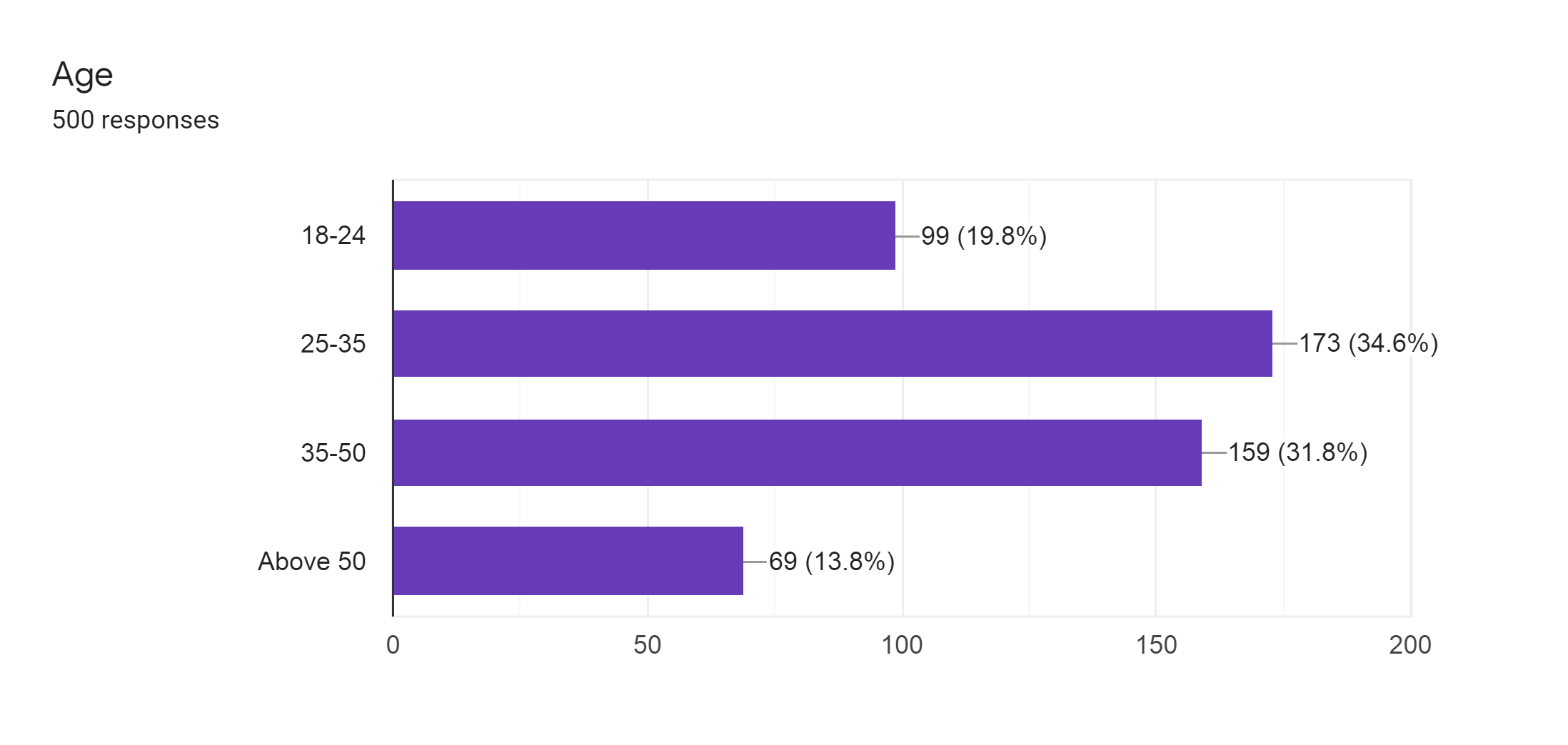
Figure 1: Respondents’ age bracket
Survey Results:
1) Twitter handles popularly identified and perceived as right-leaning: In the Indian political and media landscape, being labelled ‘left’ or ‘right’ is contextual to one’s political beliefs, party affiliations and the public stance one adopts on important issues. According to the survey, handles of @ShefVaidya (83.4%), @vivekagnihotri (76.4%), @UnSubtleDesi (73.8%), @rishibagree (67.2%) and @TrueIndology (67%) were perceived as right-leaning. Handles tweeting from a non-left perspective were also referred to as right-leaning. A few handles operated by journalists, academics and intellectuals too fell in that category.
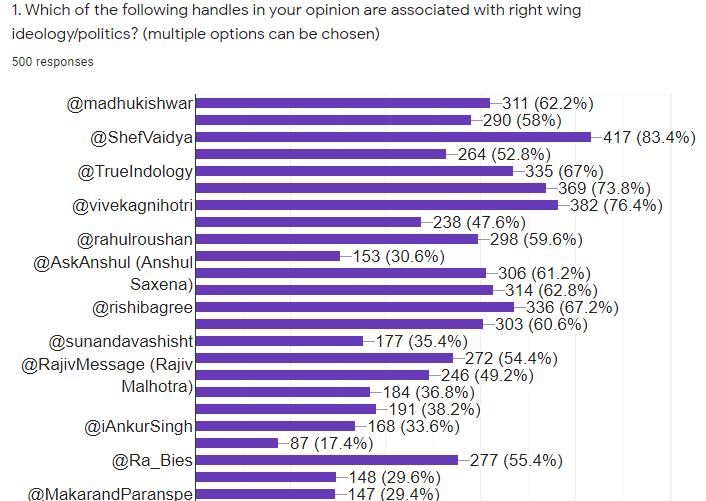
Figure 2: Handles associated with right-wing ideology
2) Top five right-wing handles followed on Twitter: The most followed right-leaning handles on Twitter, as evident from the figure below, were - @ShefVaidya (72.8%), @vivekagnihotri (65.2%), @TrueIndology (63.8%), @ARangnathan72 (58.2%) and @theskindoctor13 (58.2%). These handles belong to people with varied professional backgrounds such as a professor, a columnist, a filmmaker, an ordinary citizen who tweets about Indian history from a non-left prism and another who employs humour and sarcasm in his commentary on ‘right’ and ‘left’ leaning politics in India.
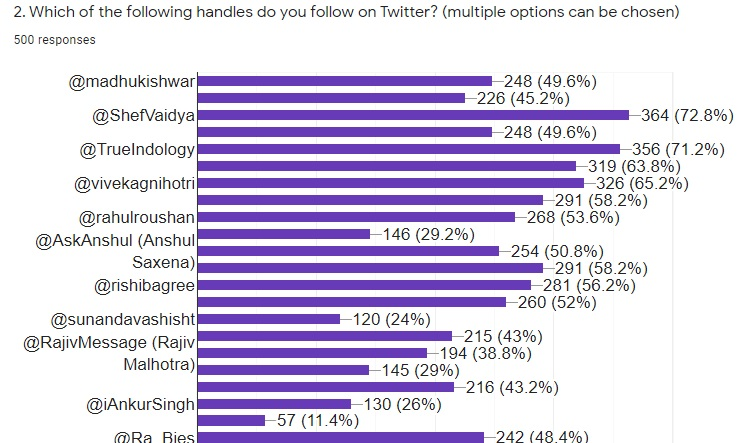
Figure 3: Twitter handles followed by respondents
3) Prominent right-leaning handles suspended owing to ideological reasons: As a response to this open-ended question, survey participants pointed out to handles such as @TrueIndology, @squintneon, @RishiBagree, @VashiMant, @Agniveer, @Asyounotwish, @AskAnshul and others being subjected to biased and unfair treatment by Twitter on being perceived as right-leaning and popularizing ‘right-wing’ narratives on the social media platform.
4) Does platform bias against the Indian ‘right’ prevail on Twitter? An overwhelming 88.6% respondents confirmed that Twitter India exhibits bias in its dealings and operations towards the Indian political ‘right’. While 6.4% respondents negated the idea of Twitter bias, 5% were uncertain about the issue. These responses ought to be examined in context of the constitution of a PSC on the protection of free speech and expression on social media, global displeasure expressed by right-wing forces over Twitter’s covert as well as overt support to the ‘left’, accusations of Twitter meddling in democratic, electoral processes and the recent confrontation between the Government and Twitter over the enforcement of new IT rules in India (2021).
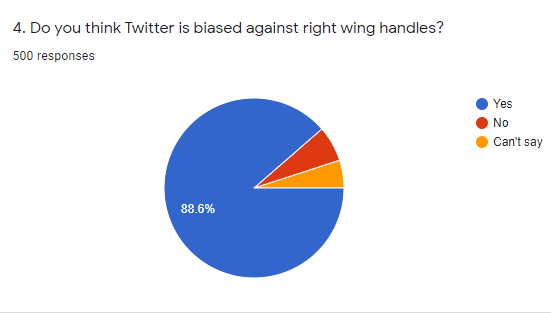
Figure 4: Twitter bias against right-wing
5) Manifestation of Platform Bias: Responses to a question about how Twitter bias towards right-leaning handles is seen on the platform, survey participants expressed that frequent suspension of handles (82.4%), shadow banning (77.6%), disappearance of tweets from follower's timeline (64.8%), handles not being verified through a ‘blue tick’ vis-à-vis left-leaning handles (59.8%) and handles being locked by Twitter (52%) are evidence of the same. Other reasons mentioned were Twitter’s failure to provide valid and reasonable explanations for its actions vis-à-vis right-leaning handles and its inability to specifically point out to the platform’s rules that the handle had allegedly violated.
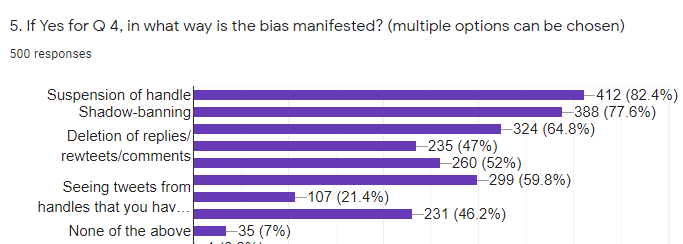
Figure 5: Modes of Twitter bias
6) How do users respond to platform bias? Twitter users have devised ways to provide cogent and appropriate responses to instances of bias on the platform. These include using hashtags to support handle’s restoration (67.4%), tagging Twitter India & influencers to demand explanation (59.4%), follow new handle created after the original is suspended/locked/shadow banned (56.8%), tweet actively about Twitter’s restrictions over free speech and expression of ‘right’ vis-à-vis the ‘left’ (58.4%) while also writing on other social media platforms to let people know about Twitter’s unfair behaviour (37.8%). Examples of few trending hashtags are - #BringBackTrueIndology, #BringBackSquintNeon, #restoresquintneon, #RestoreApurvaSingh #CongressKaTwitter, #BiasedTwitter, #BringBackVashiSharma, #IndiaAgainstPropaganda #TwitterHypocrisy, #BanTwitter, #IndiaRejectsTwitter, #CommieTwitter etc.

Figure 6: User Response
7) Support to the Parliamentary Standing Committee: 85.8 % respondents supported the constitution of a PSC on the issue of free speech and expression on social media whereas 14.2% did not. The overwhelming support to the idea of the PSC shows that Indian Twitter users exhibit awareness and acknowledgement for accountability from these platforms and demand that these function in accordance with the law of the land.
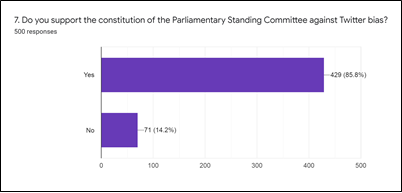
Figure 7: Support to PSC
8) Opinions on the Parliamentary Standing Committee: Open-ended responses elicited to understand why respondents supported/did not support the idea of the PSC led to four thematic explanations – 1) Reasons for support (preservation of democratic values, need to hold SM platforms accountable), 2) Solutions to address platform bias (monetary penalty, indigenous SM alternatives, self-regulation by Twitter), 3) Reasons to reject the idea of the PSC (threat to free speech, govt’s role in promoting an ideology), Miscellaneous responses (monetary benefit to the Twitter ecosystem, platform bias is an extension of mainstream media bias).
Conclusion and Future Implications of Platform Bias
- Users do not think of social media platforms as neutral entities, recognize their business interests; yet continue to access these for news/information, participation in public discourse and sharing their opinions.
- In the Indian political landscape, social media is seen as a democratizing force that allows right-leaning users to share alternative viewpoints that don’t find space in mainstream media.
- Users also recognize the need for balanced and neutral social media spaces that are open to all kinds of ideological views.
- The idea of social media accountability is gaining currency in India, yet users also express inhibitions about social media regulation, especially by governments.
- Twitter has become an important site, at least in India, for ideological consolidation. Twitter has given voice to those marginalized in mainstream media narratives.
- Platform bias, in the case of Twitter, is believed to be a virtual extension of the larger political, academic, cultural, mainstream media ecosystem in the country, still dominated by the left.
- Users expect the government to help address the issue of discrimination against social media users based on political opinion, ideology and party inclination.
References
- https://myind.net/Home/viewArticle/fairness-and-freedom-on-twitter-what-indian-twitter-users-think-of-social-media-bias-part-1
- Ewokor, C. (2021, June 8). Nigeria's Twitter ban: The people risking arrest to tweet. Retrieved from BBC: https://www.bbc.com/news/world-africa-57402349
- Fung, B. (2021, January 9). Twitter bans President Trump permanently. Retrieved from CNN Business: https://edition.cnn.com/2021/01/08/tech/trump-twitter-ban/index.html
- The Hindu. (2021, February 25). Govt announces new social media rules to curb its misuse. Retrieved from The Hindu: https://www.thehindu.com/news/national/govt-announces-new-social-media-rules/article33931290.ece
Image Source: DNA India



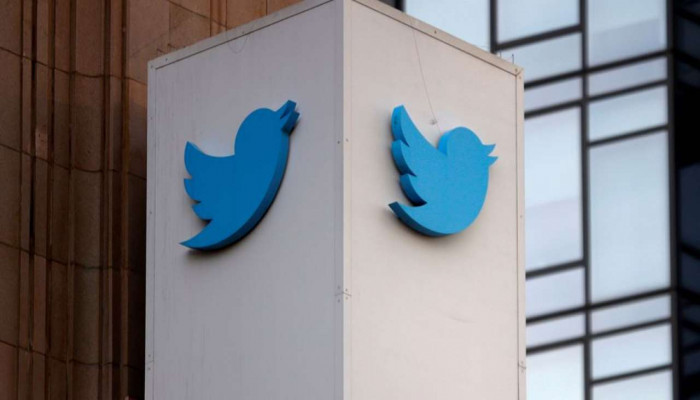



Comments